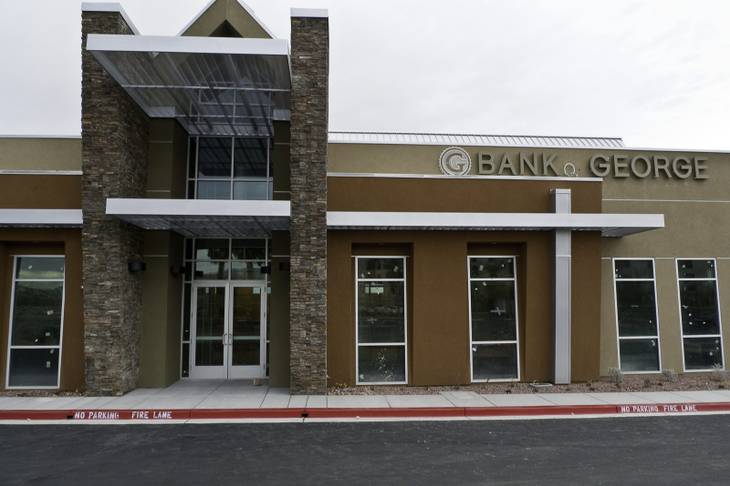When John Sullivan took charge of First Security Bank of Nevada two years ago, Las Vegas’ banking industry was in shambles.
Six local banks had been shut down, and almost every lender was losing money. Even if they wanted to make loans, the bankers lacked capital and credit-worthy clients who could repay a debt.
Fast forward to 2013. What a difference a few years makes.
Most of Clark County’s locally based community banks boosted profits or narrowed losses last year. Some lent more money and reduced the number of bad loans on their books. Others inched forward but remained bogged down by soured real estate loans and other problems.
Overall, community banks are far from thriving but are healthier than a few years ago, when the industry was bleak.
“Some banks are doing better, others are not doing worse, (and) some are bleeding a slow hemorrhage,” said Bill Uffelman, president and CEO of the Nevada Bankers Association.
Community banks, which serve small and medium-size businesses, for the most part issue commercial real estate loans and commercial and industrial debt, such as equipment loans and credit lines. They largely avoid consumer loans and typically have only one or two offices.
The industry is off to a good start this year. Eight of the valley's nine locally based community lenders reported a profit for the quarter ending March 31.
Meadows Bank, the strongest of the bunch, is the only one that increased annual profits and loan totals each of the past three years, according to federal regulatory data. First Security was profitable the past two years and shed its once dangerously high volume of delinquent loans. Bank of George and Kirkwood Bank of Nevada both posted an annual profit last year for the first time in their brief histories.
“Banking is nothing but a reflection of the local economy,” Meadows CEO Arvind Menon said. “It’s starting to improve; the trends are good.”
Before the uptick, most banks were in the red last year and issued fewer loans than in years past. Several banks came under heightened government scrutiny in recent years to improve their books.
Most notably, Bank of Las Vegas and 1st Commerce Bank, which are owned by the same bankrupt Michigan parent company, were hit in 2011 and 2012, respectively, with strict regulatory orders known as “prompt corrective actions.” The lenders improved their books after receiving the orders, which are viewed as a final warning before a bank gets shut down.
Bank of Las Vegas lost $3.7 million last year, and as of Dec. 31, almost 14 percent of its loan portfolio was delinquent, far above the national rate of 3.7 percent. In 2011, it lost $8 million, and by the year’s end, roughly 26 percent of its loans were past due, a vastly higher percentage than the national rate of 4.3 percent.
Regulators required Bank of Las Vegas Chief Operating Officer Jim Howard, who also is CEO of 1st Commerce, to raise new capital or sell his banks.
Community banks in general have been helped by rising real estate values, which cut lenders’ potential losses, Howard said.
“You either die or you eventually start pulling out of it,” he said. “That’s what we’re doing.”
Las Vegas banks soared with the building boom and crashed with the bust. Financial regulators, amid a wave of bank failures nationally, shut down six locally based lenders from fall 2008 to spring 2011.
The first to go, Henderson’s Silver State Bank, also was the largest. It had $2 billion in assets, with branches in Nevada and Arizona and sales offices in seven states.
The bank was shut down Sept. 5, 2008. Nevada State Bank acquired its deposits in a deal with regulators.
Last year, Silver State’s receiver, the Federal Deposit Insurance Corp., sued former CEO Corey Johnson, former Executive Vice President of Real Estate Lending Douglas French and two ex-loan officers. The FDIC sought to collect more than $86 million in damages tied to losses allegedly caused by the defendants' “gross negligence” on numerous real estate loans. The lawsuit is ongoing.
Johnson's lawyer John McMillan denied the allegations and said the bank's failure wasn't his client's fault.
"It was exclusively the economy," McMillan said.
Lawyers for the other bankers did not return calls for comment.
Other local banks that got shuttered after the economy collapsed include Security Savings Bank, Sun West Bank, SouthwestUSA Bank and Nevada Commerce Bank.
The county’s nine remaining locally based community banks all lost money in 2009. Meadows was the only one to turn a profit in 2010 and was joined only by First Security in 2011. Four earned a profit last year, and four increased their year-to-year lending totals, according to FDIC data.
Many banks have been trying to improve their health by raising new capital, renegotiating terms with borrowers and collecting on delinquent loans.
First Security, for instance, lost $3 million in 2009 and $8.4 million in 2010. By spring 2011, the young bank had about $16 million in delinquent loans and faced a strong possibility of getting shut down by regulators, said Sullivan, the current CEO.
Sullivan was hired in May 2011 to turn things around. After initial fundraising efforts flopped, he recruited Las Vegas attorney and entrepreneur Jason Awad to inject sorely needed capital.
Awad, now the chairman and majority shareholder of First Security, led a group that invested $14 million cash in August 2011. Since then, the bank has moved into the black and boosted its lending.
Meanwhile, Bank of George had $61 million in loans on its books at the end of 2012, down from $69 million in 2011. The bank, however, earned a $290,000 profit last year, up from a $2.5 million loss in 2011.
The bank entered a consent order in early 2011 with regulators to raise capital and make plans to shed its problem loans.
It wasn't alone.
Lenders throughout the valley have been working hard to clean up their books and deal with the region’s economic fallout, Bank of George Chairman Ed Nigro said.
“It has not been an easy process,” he said. “The ones that come out the other end will be stronger and better than ever.”

